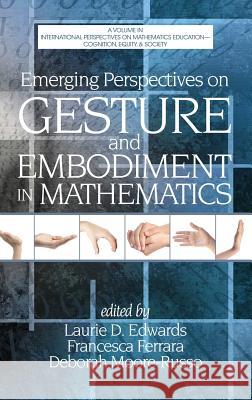Emerging Perspectives on Gesture and Embodiment in Mathematics (Hc) » książka
Emerging Perspectives on Gesture and Embodiment in Mathematics (Hc)
ISBN-13: 9781623965549 / Angielski / Twarda / 2014 / 284 str.
Emerging Perspectives on Gesture and Embodiment in Mathematics (Hc)
ISBN-13: 9781623965549 / Angielski / Twarda / 2014 / 284 str.
(netto: 399,20 VAT: 5%)
Najniższa cena z 30 dni: 407,40
ok. 30 dni roboczych.
Darmowa dostawa!
A Volume in International Perspectives on Mathematics Education - Cognition, Equity & Society Series Editor Bharath Sriraman, The University of Montana and Lyn English, Queensland University of Technology The purpose of the book is to consider embodiment as it applies to mathematical thinking, and to link mathematics education research to recent work in gesture studies, cognitive linguistics and the theory of embodied cognition. Just as in past decades, mathematics education experienced a "turn to the social" in which socio-cultural factors were explored, in recent years there has been a nascent "turn to the body." An increasing number of researchers and theorists in mathematics education have become interested in the fact that, although mathematics may be socially constructed, this construction is not arbitrary or unconstrained, but rather is rooted in, and shaped by, the body. All those who engage with mathematics, whether at an elementary or advanced level, share the same basic biological and cognitive capabilities, as well as certain common physical experiences that come with being humans living in a material world. In addition, the doing and communicating of mathematics is never a purely intellectual activity: it involves a wide range of bodily actions, from committing inscriptions to paper or whiteboard, to speaking, listening, gesturing and gazing. This volume will present recent research on gesture and mathematics, within a framework that addresses several levels of mathematical development, including early number sense, high-school topics, and university-level concepts. The overall goal for the volume is to acknowledge the multimodal nature of mathematical knowing, and to contribute to the creation of a model of the interactions and mutual influences of bodily motion, spatial thinking, gesture, speech and external inscriptions on mathematical thinking, communication and learning. The intended audience is researchers and theorists in mathematics education as well as graduate students in the field.











